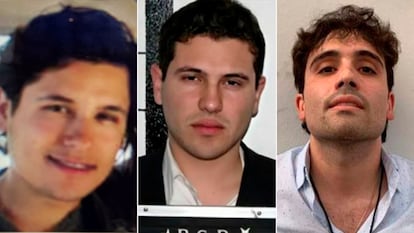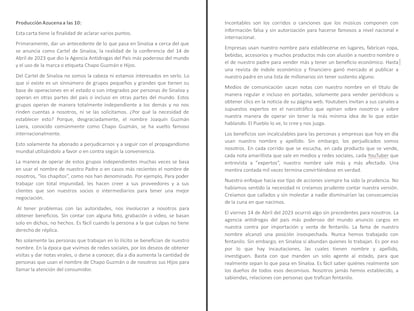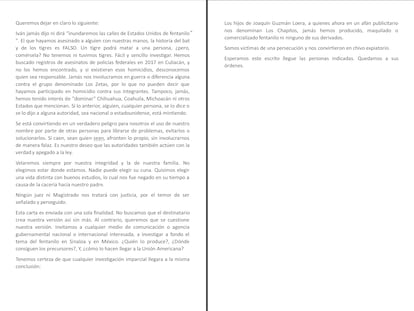Los Chapitos respond to DEA indictment: ‘We have never produced, manufactured or marketed fentanyl’
A lawyer for the Guzmán family shared a statement with Mexican television in which the heirs of ‘El Chapo’ claim they are ‘victims of persecution’ because of their notorious father

Los Chapitos, a faction of the Sinaloa Cartel led by the sons of jailed drug kingpin Joaquín “El Chapo” Guzmán, have issued a statement denying that they have taken over their father’s drug-trafficking empire and distancing themselves from involvement in the fentanyl epidemic engulfing the United States.
“We are not the leaders of the Sinaloa Cartel, nor are we interested in being so,” begins the letter sent to Mexican journalist Azucena Uresti, an anchor for cable news channel Milenio. El Chapo’s four sons — Ivan Guzmán Salazar, Alfredo Guzmán Salazar, Joaquin Guzmán López and Ovidio Guzmán López — said that they were “victims of persecution and had been made scapegoats” in the wake of a U.S. Justice Department indictment handed down on April 14 naming 28 members of the Sinaloa Cartel in a sweeping investigation into fentanyl trafficking.
Among the crimes EL Chapo’s sons were charged with are organized crime and drug trafficking, illegal possession of weapons and money laundering. In the statement, delivered to Uresti’s production team by José Refugio Rodríguez, who claims to be a legal representative for Los Chapitos, the four brothers said: “We have never produced, manufactured or marketed fentanyl.”
Ovidio Guzmán, nicknamed “The Mouse,” was arrested in a Mexican security services operation in Culiacán, the capital of Sinaloa, in January. His three brothers remain at large with bounties on their heads of between $5 million and $10 million. “It’s easy when the person you are accusing has no right of reply,” the letter said. EL Chapo’s heirs added they had “not felt the need nor did we think it prudent to tell our version. We believed that keeping quiet and not bothering anyone would diminish the consequences of the cradle in which we were born.”
“The anti-drug agency of the most powerful country in the world announced charges against us for importing and selling fentanyl,” they said in reference to the U.S. Drug Enforecement Agency (DEA). The agency’s director, Anne Millgram, said this week that the power Los Chapitos hold over the Sinaloa Cartel has exceeded that of their notorious father. “The cartel has never been more powerful and has never made more money,” Millgram told a conference sponsored by the Milken Institute, in which the DEA director said the Sinaloa Cartel has a presence in over 40 countries worldwide.
“We have never worked with fentanyl,” Los Chapitos insisted. “We have never knowingly established relationships with people who traffic fentanyl.” El Chapo’s sons place the blame for the accusations against them at the feet of their father, “who has become internationally famous.” They also deny the existence of the Sinaloa Cartel as a cohesive or monolithic organization. “What does exist is a number of small and large groups that have their base of operations, or are made up of, people from Sinaloa and who operate in other parts of the country or even other parts of the world,” they stated. According to their version, Los Chapitos say that each group operates “completely independently” and “do not report to us, nor do we ask them to.”


Furthermore, Los Chapitos claim that these independent groups use their name as a “brand” or in the drug trade: Chapo Guzmán and sons. “In order to operate with total impunity, they lead their suppliers and clients to believe that they are our partners or intermediaries in order to obtain better deals,” they claim. “This has only contributed to harm us,” they add.
El Chapo’s heirs went on to say that they feel they have been the victims of a trial by media. “In every narco-ballad, in every tabloid news story and on social media, every YouTuber who interviews ‘experts,’ our name is dragged through the mud. The people see it, believe it, and judge us on it.”
In the indictment against Los Chapitos, the DEA claimed that it managed to infiltrate the Sinaloa Cartel’s leadership and document over 18 months how the criminal organization manufactured fentanyl, covered up the money trail via crypto payments and intimidated their rivals by beating them with baseball bats and even feeding them to the tigers that El Chapo’s sons kept as pets.
Los Chapitos deny these accusations. “The stories about the bats and the tigers, that we killed someone with our own hands, are false,” they claim. “A tiger can kill a person, but eat him?” They also reject the accusation that they attempting to spark a turf war in Michoacán, Coahuila, Chihuahua, and other states against traditional enemies such as Los Zetas. “A lie told a thousand times ends up becoming the truth,” they state in the letter, paraphrasing Nazi propagandist Joseph Göbbels.
They also deny that Ivan Guzmán Salazar, the only one of Los Chapitos mentioned by name in the missive, has said he will “flood the streets of the United States with fentanyl.” Milgram stated during her conference that the Sinaloa Cartel and the Jalisco New Generation Cartel were responsible for virtually all the fentanyl and methamphetamine consumed in the United States.
In the final section of the letter, El Chapo’s sons says they do not expect anyone to “believe our version, just like that” but to at least “ask questions.” They then do so themselves, regarding the trafficking of fentanyl to the U.S. from Mexico and Sinaloa: “Who produces it? Where do they get the precursors? And how do they get it to the United States?” Again maintaining their innocence, Los Chapitos end their statement by saying their family is in “genuine danger” and offer a message to the public. “We remain at your service.”
Sign up for our weekly newsletter to get more English-language news coverage from EL PAÍS USA Edition
Tu suscripción se está usando en otro dispositivo
¿Quieres añadir otro usuario a tu suscripción?
Si continúas leyendo en este dispositivo, no se podrá leer en el otro.
FlechaTu suscripción se está usando en otro dispositivo y solo puedes acceder a EL PAÍS desde un dispositivo a la vez.
Si quieres compartir tu cuenta, cambia tu suscripción a la modalidad Premium, así podrás añadir otro usuario. Cada uno accederá con su propia cuenta de email, lo que os permitirá personalizar vuestra experiencia en EL PAÍS.
¿Tienes una suscripción de empresa? Accede aquí para contratar más cuentas.
En el caso de no saber quién está usando tu cuenta, te recomendamos cambiar tu contraseña aquí.
Si decides continuar compartiendo tu cuenta, este mensaje se mostrará en tu dispositivo y en el de la otra persona que está usando tu cuenta de forma indefinida, afectando a tu experiencia de lectura. Puedes consultar aquí los términos y condiciones de la suscripción digital.









































